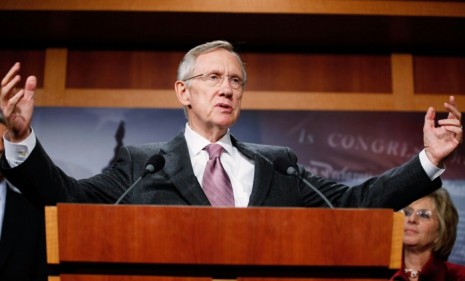Insider trading on Capitol Hill?
The Wall Street Journal says some congressional aides made money placing stock bets based on information they obtained at work. Scandal in the making?

A Wall Street Journal analysis has found that at least 72 congressional aides — including Democrats and Republicans alike — traded stocks of companies their bosses helped to oversee. For example, an adviser to Senate Majority Leader Harry Reid in 2008 doubled a $3,500 investment in a renewable-energy company that benefited from legislation Reid passed, and an aide to a Republican on the Senate Banking Committee bought Bank of America stock before the release of government stress test results that buoyed financial stocks. These people have inside information on matters that can drive the markets. Is it ethical for them to glean investment tips from what happens on Capitol Hill? (Watch a Fox News discussion about the insider trading)
What a disgrace: It's bad enough that congressional staffers feel entitled to profit from insider information, says Matthew Sheffield at the Washington Examiner. But the truly disgusting thing is that it is perfectly legal, since insider-trading laws apply to business executives but not to members of Congress or their staffs. And "basically no one in Congress is interested in fixing this situation."
"Insider trading in the halls of Congress"
The Week
Escape your echo chamber. Get the facts behind the news, plus analysis from multiple perspectives.

Sign up for The Week's Free Newsletters
From our morning news briefing to a weekly Good News Newsletter, get the best of The Week delivered directly to your inbox.
From our morning news briefing to a weekly Good News Newsletter, get the best of The Week delivered directly to your inbox.
This is "appalling" and possibly criminal: Members of Congress "probably aren't covered by existing insider trading laws," says Stephen M. Bainbridge at ProfessorBainbridge.com, but their staffers don't have the same "blanket immunity." The problem is that the Securities and Exchange Commission would rather go after people like Bernie Madoff than senior congressional aides. "It's appalling what those folks in D.C. get up to, especially when most of them spend so much of their time demonizing business."
"More evidence of insider trading inside the beltway"
Sorry — no big scandal here: The Journal is "over-egging its findings," says Felix Salmon at Reuters. Maybe a few who work on Capitol Hill did make money on their stock bets. But if you took two years of trading data from any 1,700 upper-middle-class American households, the laws of chance would ensure that you would find 72 cases where people made such "profitable trades." If the Journal had proof staffers were making money on "nonpublic information," we would have a problem. "But let's not try to gin up a scandal where none exists."
"The congressional insider-trading non-story"
A free daily email with the biggest news stories of the day – and the best features from TheWeek.com
-
 World’s oldest rock art discovered in Indonesia
World’s oldest rock art discovered in IndonesiaUnder the Radar Ancient handprint on Sulawesi cave wall suggests complexity of thought, challenging long-held belief that human intelligence erupted in Europe
-
 Claude Code: the viral AI coding app making a splash in tech
Claude Code: the viral AI coding app making a splash in techThe Explainer Engineers and noncoders alike are helping the app go viral
-
 ‘Human trafficking isn’t something that happens “somewhere else”’
‘Human trafficking isn’t something that happens “somewhere else”’Instant Opinion Opinion, comment and editorials of the day